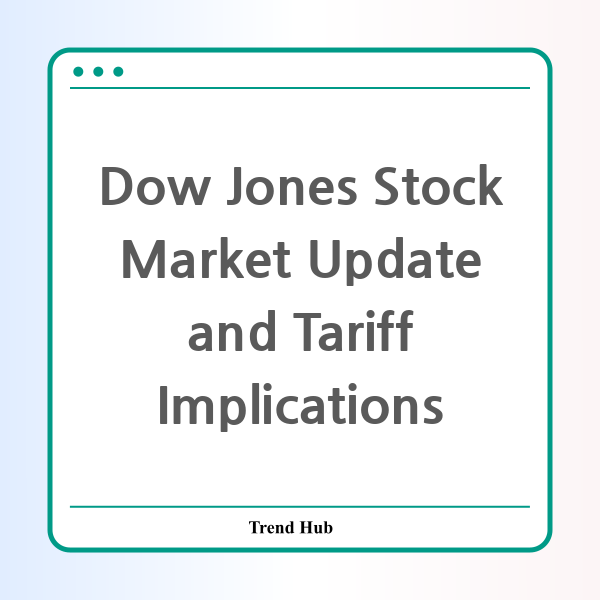* This website participates in the Amazon Affiliate Program and earns from qualifying purchases.

As the U.S. stock markets react to the latest developments in the ongoing trade tensions between the U.S. and China, investors are left pondering: what does this mean for the Dow Jones and the broader market? With President Trump’s tariffs hanging in the air, the landscape is changing—and fast.
On Monday, the Dow Jones Industrial Average rose significantly, climbing 312 points, or 0.78%, reflecting a wave of optimism following the announcement of tariff exemptions for certain technologies. The tech-heavy Nasdaq Composite and the broader S&P 500 also enjoyed gains of 0.64% and 0.79%, respectively. However, while stocks rallied, confusion about the trade war and its implications continues to loom large.
To better understand the impact of these tariffs on the stock market, let’s delve into the key developments. President Trump recently indicated that tariffs on consumer electronics—including smartphones and computers—might not apply, causing a temporary surge in investor confidence. Yet, this reassurance is juxtaposed against a backdrop of escalating retaliatory tariffs from China, where duties on U.S. goods have increased significantly. The risk of a prolonged trade war remains high, and investors are treading carefully.
Furthermore, as companies like Nvidia and Apple make substantial investments in U.S. technology infrastructure, analysts debate the timing and motivations behind these moves. Is it a strategic maneuver to sidestep tariffs or a genuine commitment to innovation? Whatever the case, these investments may shield these tech giants from the harshest tariff impacts in the short term.
Despite the recent stock gains, the uncertainty surrounding ongoing tariff policies adds complexity to market predictions. Commerce Secretary Howard Lutnick's comments that the current exemptions are temporary only serve to create more ambiguity. As the trade war evolves, companies must navigate shifting regulations and tariffs, which can lead to significant volatility in stock prices.
It’s essential to highlight that the tariffs on auto parts are set to go into effect soon, and Trump’s consideration for exemptions is raising eyebrows. Automakers such as Ford and General Motors saw their stock prices surge by over 3% following news of potential leniency from the White House. This illustrates the direct correlation between trade policy announcements and market reactions, further emphasizing the role that political decisions play in financial markets.
Moreover, the broader implications of these tariffs extend beyond the tech and automobile sectors, affecting various industries reliant on imports. The uncertainty around Trump's trade policies is dampening Wall Street’s outlook for the economy, with analysts indicating that the market has become more sensitive to trade-related news. Investors are advised to remain vigilant and prepared for volatility as the situation develops.
In summary, the Dow Jones index's recent uptick demonstrates the market's resilience amidst political turbulence, but it is evident that the fog of uncertainty surrounding tariffs needs to be lifted for a clearer outlook. Despite temporary gains, sustained growth may hinge on the eventual resolution of trade conflicts and the clarity of U.S. trade policies.
As we continue to monitor these developments, one thing remains certain: the interplay between tariffs and market performance will be a pivotal narrative in the weeks and months to come. Stay tuned as we navigate this complex landscape in the stock market.
* This website participates in the Amazon Affiliate Program and earns from qualifying purchases.